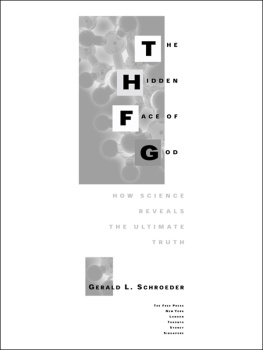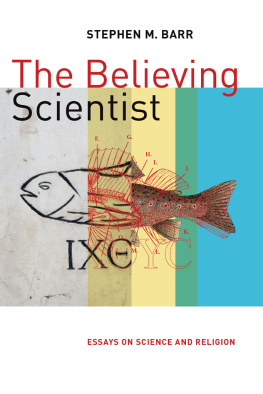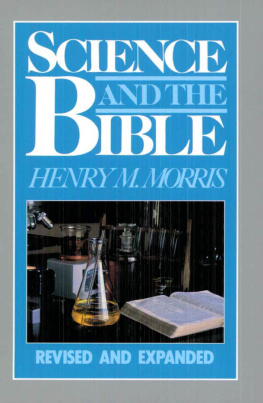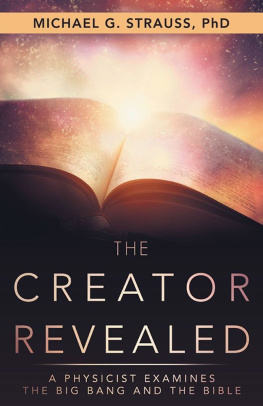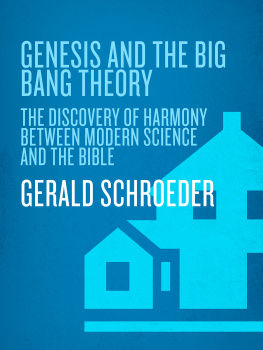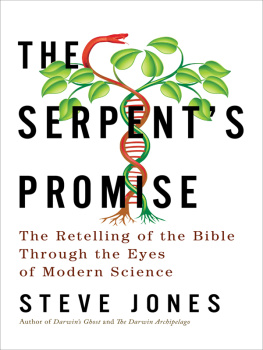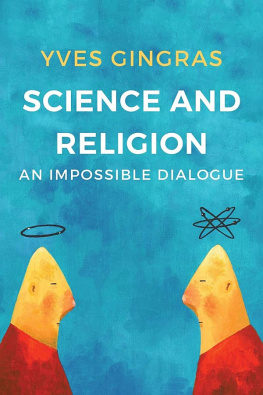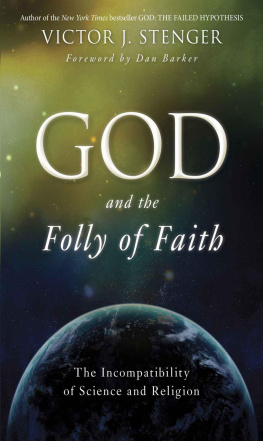OTHER BOOKS BY GERALD SCHROEDER
Genesis and the Big Bang: The Discovery of Harmony Between Modern Science and the Bible
The Hidden Face of God: How Science Reveals the Ultimate Truth
God According to God: A Physicist Proves Weve Been Wrong About God All Along

A Division of Simon & Schuster, Inc.
1230 Avenue of the Americas
New York, NY 10020
Copyright 1997 by Gerald Schroeder
All rights reserved, including the right to reproduce this book or portions thereof in any form whatsoever. For information address Free Press Subsidiary Rights Department, 1230 Avenue of the Americas, New York, NY 10020
FREE PRESS and colophon are trademarks of Simon & Schuster, Inc.
The Simon & Schuster Speakers Bureau can bring authors to your live event. For more information or to book an event contact the Simon & Schuster Speakers Bureau at 866-248-3049 or visit our website at www.simonspeakers.com.
Library of Congress Cataloging-in-Publication Data
Schroeder, Gerald L.
The science of God: the convergence of scientific and biblical wisdom / Gerald Schroeder.
p cm.
Includes bibliographical references.
1. Bible and science. I. Title.
[BS650.S35' 1998] 98-25031
261.5'5dc21 CIP
ISBN-13: 978-1-4391-3596-9
ISBN-10: 1-4391-3596-7
Visit us on the Web:
http://www.SimonandSchuster.com
To my wife and children,
who asked the many hard questions,
and to those rare scientists and theologians
who admit that the questions exist.
The heavens speak of the Creators glory and the sky proclaims Gods handiwork.
P SALMS 19:2
The only path to knowing God is through the study of scienceand for that reason the Bible opens with a description of the creation.
M AIMONIDES , G UIDE FOR THE P ERPLEXED (1190)
CONTENTS
LIST OF ILLUSTRATIONS
PREFACE
In Moses Maimonides seminal work, Guide for the Perplexed (1190), the philosopher-theologian summarized what in his opinion was the only path to understanding Gods actions in this world. We need to form a conception of the existence of the Creator according to our abilities. That is we must have knowledge of madah Elokut ( madah meaning the science of and Elokut meaning God), the Science of God, which can only be acquired after a study of madah teva ( teva being the Hebrew word for nature), the science of nature. For the science of nature is closely related to the science of God and must precede it in the course of study. For that reason God commenced the Bible with a description of creation.
The science of God is what we seek in this book. Well study nature, especially as it coincides with the Bibleprimarily Genesis, chapter one. Both nature and the inner meanings of the biblical story are multifaceted and complex, but two sources of knowledge will suffice: the discoveries of modern science and the commentaries of the ancient sages who reached beyond the superficial meanings of the text. Limiting ourselves to ancient commentators eliminates the possibility of text deliberately bent to match todays scientific understanding of the world.
To understand in depth the significance of any one passage of the Bible, it is assumed that the reader knows the entire Bible thoroughly. In the context of this book, it means being acquainted with all 187 chapters of the Five Books of Moses, the Torah. The often misunderstood demand for an eye for an eye (Ex. 21:24) sounds brutal or at least highly primitive. When read in context with later elaborations (Lev. 24:17 and Num. 35:30, 31), however, eye for eye, tooth for tooth, and burn for burn describe monetary compensations in accord with the extent of the wound. Only for murder is there no compensation since all life is of supreme value. The revolution in this very ancient code is that the law was the same for citizen and for stranger (Lev. 24:22). In fact, this passage signifies that dawn had broken over the darkness of the pagan world.
Similarly, when Genesis chapter one, the creation chapter, records a six-day period from the creation of the universe to the creation of the soul of Adam (Gen. 1:27), this seems a totally naive understanding of the universe and its age, let alone the origin of humans. As we will discover, the ancient scholars were anything but naive. Commentators rigorous study of the wording of Genesiss opening chapters neatly folds the multiple of billions of years into six twenty-four-hour days, even as the days remain twenty-four hours long and the years remain 365 days long.
A simplistic reading of the Torah places our human origins at less than six thousand years in the past. Yet fossils of Homo sapiens extend back sixty thousand years. Neither source of knowledge need alter its view. Nahmanides, seven hundred years ago, Maimonides over eight hundred years ago, and the Talmud, dating back some sixteen hundred years, discuss the existence of beings living before and alongside Adam. They were described as human in shape and intelligence but lacking the soul, the neshama , to make them human. There is no trickery here.
The problem that so many of us have with a host of issues that touch on both the Bible and sciencedinosaurs, prehuman humans or hominids, the age of the universeis that our understanding of the Bible is often one gained as children. Yet our scientific understanding growseven if we only get that science from newspapers or the Web. Obviously when the Bible is juxtaposed with science, it seems simplistic. We intend, at least in part, to correct that error.
Why would God have described our cosmic history in the Bible in terms that seem to contradict the workings of the universe? The Bible was as accountable to its earliest audience, a largely uneducated population of recently freed slaves, as it would be to scholars through the ages. So it works on a number of levels and is filled with subtle hints of much deeper truths confirmed by the underlying truths of nature.
When we look at the vast variety of life we wonder why a Creator would bother: who needs this fantastic web of life? The earths ecology would balance just as well without multicolored fish off the coasts of Eilat Akaba. Its almost as if God had given nature the opportunity to invent itself. This is very nearly the case. God, speaking through the prophet Isaiah, informs us that in the act of creation, He willingly withdraws a portion of Divine control and allows events to proceed unhindered. Humans call it free will. When events veer too far off the desired course, God steps in and redirects the way. Noahs flood is a classic biblical example of God pressing the reset button on society. Was the demise of the dinosaurs, 65 million years before Adam in our time perspective, a Divine resetting of the earths ecology? God runs this world, our world, as the Divine perspective sees fit. Hence we are told explicitly, I will be that which I will be (Ex. 3:14). The God of the Bible is a dynamic Force, known by Its acts, not the static God described by the erroneous translation of King James, I am that I am . We cannot pigeonhole God, as God told Job. There are aspects of the Divine that we can never rationalize. These limits not withstanding, the opening word of Genesis, Beraisheet , the very first word of the Bible, contains meaning far beyond the simplistic In the beginning or With a beginning or From a beginning. In 1090, Rashi, commentator par excellence, gave us the actual meaning of that evocative opening. Based on the Jerusalem translation of the Bible from Hebrew to Aramaic, some two millennia ago, Rashi quotes from proverbs 8: I am wisdom. God made me as the beginning of his way, the first of his works of old. The first of the creations was not the big bang creation of our universe. The first Divine creation was wisdom. And from that Divine source, the physical universe emerged. The evocative opening sentence of Genesis is best translated. With wisdom God created the heavens and the earth. Wisdom is the substrate of all existence and is found in its every aspect.


